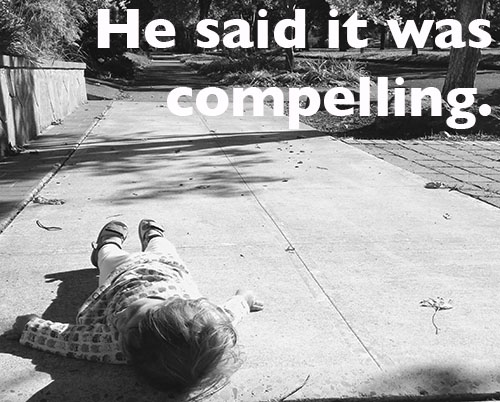Imagine you’ve just walked into Powell’s; the tables of books stand before you, as does a maze of shelves beyond shelves filled with potential rainy-day material. A cover with interesting lines and a clever title catches your eye. You walk over and pick it up, naturally flipping the book to the back cover. Blurbs. Now, just take a minute (thirty seconds if that’s all you’ve got) and decide whether to read it. Will what others have said about the book (and who) motivate you to make the purchase? Will the mood you’re in affect this decision and allow you to fall victim to this persuasive game? Does the influence change depending on whether you were hunting for something specific or just browsing?
I don’t choose books based on the author, generally not even genre. I like to read what others have inspired and motivated me to read (whether it is a blurb or my mother-in-law). Read Nicole Krauss’s blurb about David Grossman’s book, To the End of the Land :
“Very rarely, a few times in a lifetime, you open a book and when you close it again nothing can ever be the same. Walls have been pulled down, barriers broken, a dimension of feeling, of existence itself, has opened in you that was not there before. To the End of the Land is a book of this magnitude. David Grossman may be the most gifted writer I’ve ever read; gifted not just because of his imagination, his energy, his originality, but because he has access to the unutterable, because he can look inside a person and discover the unique essence of her humanity. For twenty-six years he has been writing novels about what it means to defend this essence, this unique light, against a world designed to extinguish it. To the End of the Land is his most powerful, shattering, and unflinching story of this defense. To read it is to have yourself taken apart, undone, touched at the place of your own essence; it is to be turned back, as if after a long absence, into a human being.”
I would eat this blurb up (well, I kind of did). However, several entities reporting on this blurb thought it to be overwhelming and simply too much. What’s your take? Is it too passionate? Over the top? Would it turn you away? Miss Krauss certainly created some buzz around Mr. Grossman’s book—no publicity is bad publicity. The book was rated with five stars by 56 percent of people on Amazon, and some of those reviews appear to have a similar reaction to the story.
So do blurbs serve a purpose?
If you’re a new author and you land a blurb from an author respected by the industry, related to your genre, and more importantly, has a reader fan base, rock-on man; you’ve got some gold in your pocket. Blurbs don’t only serve the author and consumer, though; they also impress other publishers, editors, designers, bookstores, and book retailers.
The truth is, we don’t know a ton about the effectiveness of a blurb. However, NPR’s recent article shared that CodEx Group, an independent audience research firm, has worked with many major publishers testing a variety of book covers (including covers with no blurbs) to understand consumer habits. What was discovered? It matters who is blurbing and whether it is actually bringing value to your book. I suppose that leaves us in a pit we’ve already been puttering around. It’s nice to have some assurance that the hard work is valuable.
So I’m curious about how digital publishing is changing the world of blurbs. Gary Shteyngart has a tumblr page dedicated to his blurbs. Is this the wave of the future: utilizing authors’ social media pages and websites and asking to post about a book? Perhaps. When browsing Amazon, do consumers still read the blurbs? It isn’t as natural a process as flipping a book to the back cover in your hands—could there be a physical and visual attachment to blurbs? What do you think?

